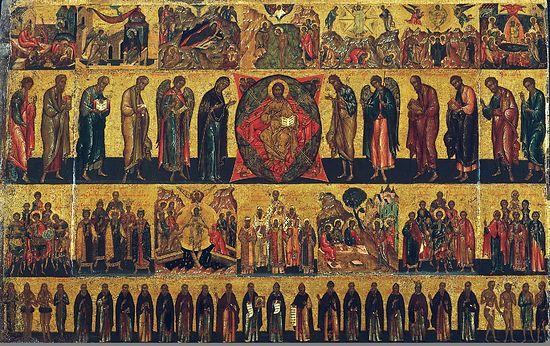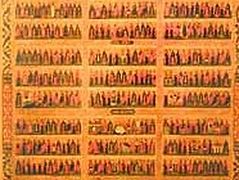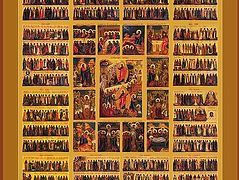A week ago, the Church celebrated the Sunday of All Saints, on which we give honor to all those who pleased God by their lives, known and unknown. It included everyone from the time of Christ and even before, in the Old Testament—all children of the One God.
This last Sunday, different nations celebrated the saints who have shown forth in their lands—their own “families”, as it were. The Church calendar declares the second Sunday after Pentecost to be Sunday of All Saints of Russia, Sunday of All Saints of Mt. Athos, Sunday of All Saints of Palestine, Sunday of All Saints of Romania, Sunday of All Saints of the Iberian Peninsula, and even Sunday of All Saints of America. Other synaxes of the saints of various lands are celebrated on subsequent Sundays. Next Sunday are celebrated All the New Martyrs of the Turkish Yoke, All Saints of St. Petersburg and Ladoga, All Saints of Novgorod, Pskov, Belorussia, and Vologda, All Saints of Galicia, All Saints of Poland, All Saints of Odessa, and All Saints of Britain and Ireland.
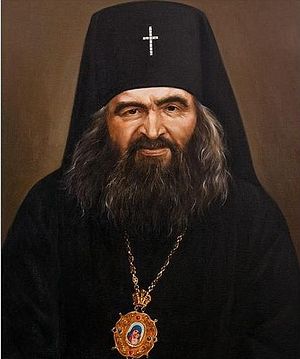 St. John of Shanghai and San Francisco Why do these countries and even cities take such “pride” in their own saints as to hymn them exclusively on a special Sunday? Let’s first look at how the Orthodox view saints. St. John of Shanghai and San Francisco (who can be claimed by four different countries) talks about the nature of saints:
St. John of Shanghai and San Francisco Why do these countries and even cities take such “pride” in their own saints as to hymn them exclusively on a special Sunday? Let’s first look at how the Orthodox view saints. St. John of Shanghai and San Francisco (who can be claimed by four different countries) talks about the nature of saints:
Saints are those who have partaken of the Divine nature and made it their own; to God, they become "His own." The saints enjoy blessedness, for God is blessed. From them there is light for men. Through them the power of God is revealed. Saints retain all that is characteristic of the human condition; they know everything that is ours. They are near to God, but they are also near to us; they walked and dwelt among us.
That they dwelt among us is a very concrete thing. St. John himself dwelt comparatively recently among Russians, Serbs, Chinese, the French, and Americans—these last having been given the great blessing of preserving his relics on their West Coast. They might be proud of this, just as every land can be of their “own” saints. But is that the point of this commemoration? Are Russians, Greeks, Serbs, Romanians, or other historically Orthodox peoples waxing nationalistic by glorying in their own saints?
The service for the Sunday of All Saints of Russia has a particularly stirring special melody for a verse at Great Vespers. “O land of Russia, holy city, adorn your house, and glorify the great and divine hosts of saints in it!” Not only glorify, but emulate, as Metropolitan Philaret (Vosnesensky) of Eastern America and New York (†1985) noted in a sermon on the Sunday of All Russia Saints:
The Russian saints call us to follow after them, not only to glorify them. Once the Holy Hierarch Theophan the Recluse wrote that if one wants to glorify a saint, then one should not only glorify him, but emulate his podvigs.1
“Holy Rus’! Preserve your Orthodox faith—in it is your strength,” the verse concludes. St. John of Shanghai elaborates on this:
The Day commemorating the saints who have shown forth in the Russian land points to that spiritual heaven beneath which the Russian land was founded and lived.
Before the holy Prince Vladimir, there lived on the Russian land separate, pagan tribes that warred with one another. The holy Prince Vladimir brought them a new faith, a new consciousness and meaning of life, a new inner spiritual state; he gave them a new spirit of life that united everyone, and thus a single nation was formed.
The very existence of the Russian nation is tied to the begetting of spiritual life within it, with the assimilation of the fundamentals of a Christian world-view. It is senseless to seek the meaning and purpose of life in earthly life, which ends with death. One must strive to acquire the Divine, grace-filled, eternal life, and then this temporal, earthly life will arrange itself as well: Seek ye first the Kingdom of God and his righteousness; and all these things shall be added unto you (Matt. 6:33).
Faith and the Orthodox Church united the separate tribes into one nation. Faith in the Kingdom of God and the search for it, the search for righteousness [pravda] became the most salient characteristic of the Russian people…
It was not only those who withdrew from the world and from the company of men, who thought about heaven and the Kingdom of God; all believing Russian people understood the meaning of life. All who truly contributed to the development of Russia as a nation, likewise considered that their primary concern was to be faithful to the Divine Kingdom and to Divine Truth [Pravda].
In Russia there were princes, military leaders, landowners, people of all ranks and occupations; and all had in common a fundamental understanding and striving, which were the acquisition of the Kingdom of God and participation in it. This was the meaning of life.
Saint Alexander Nevsky spent his entire life in struggles on behalf of the military and the State; he rode on horseback through the whole of Siberia to the Tartar khan in order to establish peace in Russia, and became renowned for his military victories. But when he fell ill and death came, he accepted it as liberation from the labors of earthly life and gave himself over to that which was dearer than everything to his soul and became a monk, in order to enter the longed-for Kingdom of God, not as an earthly warrior, but as a warrior of Christ…
The assimilation of the Christian faith regenerated the Russian princes as well. Authority is always an expression of consciousness and will. Authority is always guided by one or another philosophy, by one or another understanding of the meaning and purpose of life and its activity. Before Saint Vladimir, Russian princes were leaders of warring tribes and waged wars for the sake of military spoil and glory. Having become Christians, they became the heads of separate parts of one nation. With the acceptance of Christianity came a sense of unity. Righteousness was in the brotherhood of princes, and internecine war became unrighteous.
Prince Vladimir gave the Russian people a new meaning of life and a new vitality. Calamities, failures and defeats are powerless before the main force of life, powerless before spiritual life. The Kingdom of God, the spiritual joy of participating in it remain untouched. The terrible storm passes, and again a man lives. Thus, during the most cruel tortures, the martyrs rejoiced, sensing God's grace.
This is the source of Russia's vitality…2
Each Orthodox nation can recount similar histories and tell the stories of like leaders. Are they boasting? Or are they cleaving heart and soul to their saints’ path, which led them from a dark, savage, individualistic existence to that of a nation, a family united under God, the disciples of Christ—Who in turn gives them the strength to face all disaster and come out of it better people.
Where is nationalism in this? Nationalism precludes a belief that your nation is somehow better than all other nations, and encourages you to act upon that precept. Your genes are better, and everything about you is better, and therefore you have to rid of all other races the territory you happen to occupy at this moment in history. This type of group pride has been acted out for all to see in very recent history: the Turks exterminating Greeks and Armenians wherever they found them, the German Nazis systematically eradicating Jews, Gypsies, and Slavs, the butchery in the Balkans, genocide in some African countries and in the Middle East, and other slaughter on various scales. Could genocide and persecution ever be “sanctioned” by the saints that Orthodox peoples are called to glorify and emulate? The saints are filled with the Holy Spirit, and the fruit of the Spirit is love, joy, peace, longsuffering, gentleness, goodness, faith, Meekness, temperance (Gal. 5:22-23)—chauvinism is not to be found in that list.
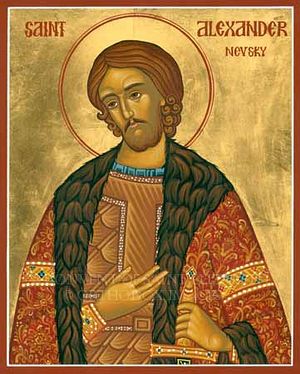 Saint Alexander Nevsky Nevertheless, an Orthodox people’s defense of their own traditions against heterodox aggression in their midst is often confused with just that—nationalism and chauvinism. St. John goes on:
Saint Alexander Nevsky Nevertheless, an Orthodox people’s defense of their own traditions against heterodox aggression in their midst is often confused with just that—nationalism and chauvinism. St. John goes on:
The Tartars burned the whole of Russia. Kiev fell, and in the same year Novgorod arose; and that great commander and leader of the Russian people, the Right-believing Prince Alexander Nevsky, roused the Russian people for a struggle, not with the Tartars, who had racked Russia's body, but with the Catholic Swedes, who, taking advantage of Russia's misfortune, wanted to seize the soul of the Russian people and kill the spiritual might of the Russian nation and Russia. For Alexander Nevsky it was necessary above all to preserve that spiritual might.3
Spiritual might—this is what a nation inherits from the labors of its saints. It does not always correspond to physical, military might, and the outcome does not always please the worldly-minded. For example, Serbia’s great saint and spiritual hero, St. Lazar, was given a choice from heaven: to win a military victory, or a spiritual victory. St. Lazar chose the latter, and was killed by the Turks. But there is a great mystery concealed in this. The Serbian people have lasted through all attempts by other nationalists to eradicate them. Neither the Ottoman Turks, nor the Croatian Ustase, who took around a half a million Serbian lives during World War II, nor the Kosovar Albanians have ultimately been able to break their spirit.
On the other hand, nationalists have always failed in the end. Germans today cannot recall the Nazi regime without utter shame, and the president of the Independent State of Croatia and Nazi collaborator, Ante Pavelić, whose head was spinning with his plan for the Serbs: “A third must become Catholic, a third must leave the country, and a third must die!" himself had to leave the country and hide in Argentina, where he was hunted down and shot in 1957. The later Croatian Prime Minister Jadranka Kosor remembers his predecessor thus: "Pavelić's regime was a regime of evil, hatred and intolerance, in which people were abused and killed because of their race, religion, nationality, their political beliefs and because they were the others and were different."4
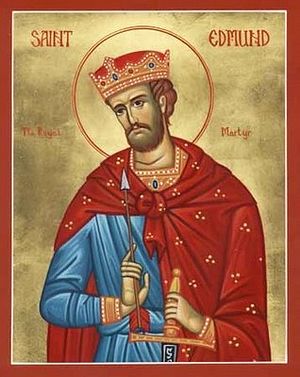 Saint Edmund, King and Martyr Saints, to the contrary, have always drawn people of other nationalities to their faith through their holy example. Even those who remained in a religion other than Orthodoxy have found shelter under the all-embracing, angelic wings of their country’s saints. This is a saintly tolerance, but one that gives place to sure defense when a foreign, ungodly element endangers the flock among whom those saints dwelt. One outstanding example of this is St. Edmund, the royal martyr of England, who was brutally murdered by the invading Danish barbarians, but later saved East Anglia by his heavenly intercessions. He appeared to the Danish King and said, “I am a terrible in defense of my own.” The Dane would later receive baptism. A ruler who has gone to the heavenly abodes cannot be accused of posthumous nationalism. St. Edmund’s virtues of meekness and submission to martyrdom could not have coexisted with the sins of hatred or chauvinism.
Saint Edmund, King and Martyr Saints, to the contrary, have always drawn people of other nationalities to their faith through their holy example. Even those who remained in a religion other than Orthodoxy have found shelter under the all-embracing, angelic wings of their country’s saints. This is a saintly tolerance, but one that gives place to sure defense when a foreign, ungodly element endangers the flock among whom those saints dwelt. One outstanding example of this is St. Edmund, the royal martyr of England, who was brutally murdered by the invading Danish barbarians, but later saved East Anglia by his heavenly intercessions. He appeared to the Danish King and said, “I am a terrible in defense of my own.” The Dane would later receive baptism. A ruler who has gone to the heavenly abodes cannot be accused of posthumous nationalism. St. Edmund’s virtues of meekness and submission to martyrdom could not have coexisted with the sins of hatred or chauvinism.
In fact, the Christian nations that embraced all newcomers into the Christian faith—not by force, but through sanctity—have flourished and become strong, while those who cling to narrow nationality have turned in on themselves and fallen. There is a curious passage from Bede’s Ecclesiastical History of England that illustrates this point. This time we are talking about the Britons, who inhabited England before the Anglo-Saxons invasions. It is the chapter entitled, “How the Britons, being for a time at rest from foreign invasions, wore themselves out by civil wars, and at the same time gave themselves up to more heinous crimes.”
In the meantime, in Britain, there was some respite from foreign, but not from civil war. The cities destroyed by the enemy and abandoned remained in ruins; and the natives, who had escaped the enemy, now fought against each other… To other crimes beyond description, which their own historian, Gildas, mournfully relates, they added this—that they never preached the faith to the Saxons, or English, who dwelt amongst them…
Had the Britons possessed the magnanimity of the early Byzantines and the Slavs, perhaps the Isles would now be speaking Welsh and not English. (The English in turn seem to be repeating this sin, and as a result their own Christian identity is all but lost.)
In 860, the Varangian rulers of ancient Rus’, Askold and Dir, attacked Constantinople and sacked the surrounding areas. The city itself was saved by a miracle of the Mother of God. This spiritual element of victory—the protection of the Mother of God—inclined the holy Patriarch of Constantinople Photius not toward revenge or contempt for the foreign barbarians, but rather to turn them to Christ. Thus, Byzantium’s response was to fortify itself militarily against further attack, but in the meantime to send missionaries to the Rus’, who would later bear abundant fruit. It is now believed that the Varangian Askold was baptized by an Orthodox bishop sent to Kiev by Patriarch Photius.
The great “Russian Bear” in turn has managed to embrace a long list of various ethnic groups ranging from the Finno-Ugric to the Asiatic. Even many Western Europeans who had made Russia their home, such as the Germans invited by Peter I and Catherine the Great, very often could not resist and “russified”, which is another way of saying that they became Orthodox Christians. Some of these non-Russians are included in the list of All the Saints of Russia, celebrated last Sunday.
The Mongol Tatars, who brought several centuries of grief and suffering to Russia, later gave that nation such God-pleasers as St. Peter, nephew of Khan Begai of the Golden Horde, who founded a monastery in Rostov, Sts. Peter and Stephan of Kazan, martyred by their Moslem countrymen, St. Serapion, founder of Kozheozersk Monastery in the north, St. Paphnuty, founder of the Borov Monastery near Moscow, and many others known and unknown. There are still Moslem Tatars in Russia, but note—Tatarstan is now in the Russian Federation and not the other way around. To be sure, Ivan the Terrible did have a tendency to force conversions, but a forced convert is not likely to become a saint.
Of the “russified” Western Europeans there is the German merchant who traded in old Novgorod and later became St. Procopius of Veliky Ustiug. And in recent history, we have two “Russian” saints of German and English descent—the holy Royal Martyrs Tsaritsa Alexandra and Grand Duchess Elizabeth.
These are all wondrous things, accomplished by all-forgiving love of Christ, and not by hatred of “them”, or by ethnic superiority complexes. Rejoicing in the saints of our land, rejoicing in our Orthodoxy, cannot lead to pride. If it does, that pride will go before a fall.
By following their saints’ example, people and nations are made strong—not to look bigger and better than others, but rather to create a safe, peaceful, God-fearing land where more and more people can become saints.

